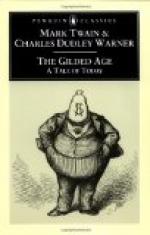“Years pass. She is in Washington, apparently the happy favorite of a brilliant society. Her family have become enormously rich by one of those sudden turns, in fortune that the inhabitants of America are familiar with—the discovery of immense mineral wealth in some wild lands owned by them. She is engaged in a vast philanthropic scheme for the benefit of the poor, by, the use of this wealth. But, alas, even here and now, the same, relentless fate pursued her. The villain Selby appears again upon the scene, as if on purpose to complete the ruin of her life. He appeared to taunt her with her dishonor, he threatened exposure if she did not become again the mistress of his passion. Gentlemen, do you wonder if this woman, thus pursued, lost her reason, was beside herself with fear, and that her wrongs preyed upon her mind until she was no longer responsible for her acts? I turn away my head as one who would not willingly look even upon the just vengeance of Heaven. (Mr. Braham paused as if overcome by his emotions. Mrs. Hawkins and Washington were in tears, as were many of the spectators also. The jury looked scared.)
“Gentlemen, in this condition of affairs it needed but a spark—I do not say a suggestion, I do not say a hint—from this butterfly Brierly; this rejected rival, to cause the explosion. I make no charges, but if this woman was in her right mind when she fled from Washington and reached this city in company—with Brierly, then I do not know what insanity is.”
When Mr. Braham sat down, he felt that he had the jury with him. A burst of applause followed, which the officer promptly, suppressed. Laura, with tears in her eyes, turned a grateful look upon her counsel. All the women among the spectators saw the tears and wept also. They thought as they also looked at Mr. Braham; how handsome he is!
Mrs. Hawkins took the stand. She was somewhat confused to be the target of so many, eyes, but her honest and good face at once told in Laura’s favor.
“Mrs. Hawkins,” said Mr. Braham, “will you’ be kind enough to state the circumstances of your finding Laura?”
“I object,” said Mr. McFlinn; rising to his feet. “This has nothing whatever to do with the case, your honor. I am surprised at it, even after the extraordinary speech of my learned friend.”
“How do you propose to connect it, Mr. Braham?” asked the judge.
“If it please the court,” said Mr. Braham, rising impressively, “your Honor has permitted the prosecution, and I have submitted without a word; to go into the most extraordinary testimony to establish a motive. Are we to be shut out from showing that the motive attributed to us could not by reason of certain mental conditions exist? I purpose, may, it please your Honor, to show the cause and the origin of an aberration of mind, to follow it up, with other like evidence, connecting it with the very moment of the homicide, showing a condition of the intellect, of the prisoner that precludes responsibility.”




